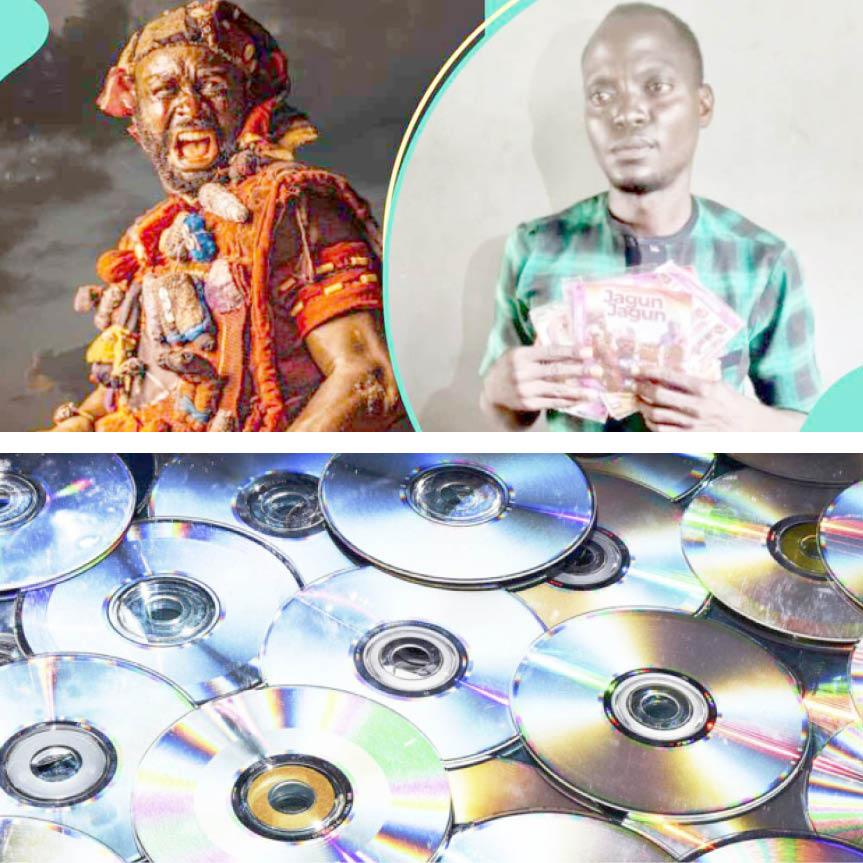I will begin with something that happened just a few days ago, when I saw the photo of a morose looking man standing, much like during a perp walk, holding copied of what appeared to be DVDs of ‘Jagun Jagun’, a recent Nigerian movie that became a global hit on the streaming service Netflix. He obviously was being ‘paraded’ for pirating the movie, and selling illegally made copies. I checked out the comments section, and all I could see was person after person making light of the situation, and some even saying he should be freed from custody, as he had “done nothing wrong”. To the last commenter I referenced, pirating a movie which cost the producers many hundreds of millions of naira to produce is nothing wrong. And therein lays a big chunk of our problem, which is the fact that Nigerians do not truly recognise piracy for the crime it is.
Now let me finesse my points with something I’ve written about before. Sometime in April, on the 28th to be precise, in commemoration of the 2023 World Intellectual Property Rights Day, the U.S. Embassy in Abuja hosted a panel discussion on ‘Women and IP: Accelerating Innovation and Creativity’, and yours truly was invited. It was announced that the aim is to highlight the importance of intellectual property rights enforcement and advocacy in economic advancement of women creators, investors and entrepreneurs, so it made sense that about 80 per cent of attendance consisted of females. It was a packed house, too.
The panellists on the terrestrial Nigerian side of things were Dr. John Asein, the Director-General of the Nigerian Copyright Commission(NCC), and intellectual property lawyer Juliana Owajimam Obih-Joseph, as well as others joining in virtually, including another intellectual property lawyer, US-based Lydia Gobena. The lively host kicked the discussions off, and the topics had quite a wide range, covering photography, writing, visual arts, etc. The panellists used personal experiences and anecdotes to weigh in on the issues at hand.
Guests appeared to mainly be made up of creatives, legal practitioners, and a scattering of government officials, and everyone seemed to have a question. That’s a good thing of course, as it means the attendees were there due to interest and their queries were organic. Now, not to label mine, too, as organic, but I was curious as to what the NCC was doing – or will do – about the rise and rise of AI (Artificial Intelligence), as it is the number one tech-based hot-button issue globally now. Dr. Asein answered in a way that was both cryptic and satisfying. In other words, he answered with government-speak, which made it a contradiction of sorts, as he was both likeable and accessible.
Why 20% SSB tax is in national interest – FG
FG, Ogun partner on establishment of bee keeping factory
That is not to say he evaded or anything like that. It just showed me a man who is doing a ton of work, in an environment where a billion megatons of work is required. He also struck me as a gracious, driven professional who knows his onions. This was even clearer when he answered my question on what they are doing about piracy beyond counterfeit book seizures and burnings. First of all, he said, ‘no more burnings’, to which the entire hall laughed. Then he explained in great detail how his organisation operates, including plans to work with customs officials to intercept pirated material being brought in. Sounds good, right?
Another question would have come in the shape of a cautionary tale, in which a big-time book publisher friend of mine saw one of his biggest hits being hawked in traffic, and he weirdly saw it as some twisted form of validation of his success. ‘You can only be sure your book is a hit in Nigeria if its pirated copies are peddled in traffic jams,’ he’d told me. I waited for the punchline, before realising he was not joking. I also wanted to ask Dr. Asein just how accessible the NCC is for IP owners who have enquiries, but I somehow knew I’d be directed to a website.
I had more questions, like the fact that a good chunk of pirated books are made in Nigeria, but I had to let go seeing as it was not an interview, so others could ask theirs. It was a vibrant session, and most hands were raised during Q & A, all asking about some of the most varied IP-related stuff. The questions I still have include whether we have a proper system to curb piracy, IP theft, and others. Like, real systems, not the typical ‘we’re on top of the situation’ ones, while said situation is showing us ‘shege’.
Many, many years ago, now-late American rapper DMX was in Abuja for a concert, and asked to be taken to where compact discs (CDs) are sold, probably so he could meet fans and autograph some. Some numbskull took him to Wuse Market, where horribly bootlegged copies of his album were proudly thrust in his face by excited sellers who probably knew zero about the grievous harm they were doing to someone else’s intellectual property. The superstar artiste, also known for his short temper, lashed out and started smashing the fake CDs. The bulky young men who owned the shops almost mobbed him, but for the intervention of his Nigerian handlers. If you can believe the audacity within that scenario, then you can begin to imagine just how brazen pirates can be in Nigeria.
You see, piracy and copyright infringement are major issues in Nigeria, with the film, music, and software industries being the most affected. The NCC has been working to combat piracy and enforce copyright laws, but it remains a challenging issue. A 2020 report by the International Intellectual Property Alliance (IIPA) had Nigeria on a ‘priority watch list’ due to its inadequate legal framework for intellectual property protection, ineffective enforcement mechanisms, and widespread piracy and counterfeiting. In the music industry, it has been estimated that piracy has caused a loss of over $100 million annually. Similarly, in the film industry, it is estimated that piracy results in a loss of over $1 billion annually.
The impact of piracy and copyright infringement on the Nigerian economy and creative industries is significant, with loss of revenue and jobs, and reduced investment in the sector. It is important for the Nigerian government and relevant stakeholders to continue to address this issue, before it begins to look like we have copyrighted piracy. Because, as it is today, it would be a hard sell convincing anyone outside our climes that that’s not the case.
Note: If you’ve figured out the running gag (or irony) in this edition of Column No. 6, do send me a text message and you could win yourself a couple of brand-new books written by Nigerian authors.




